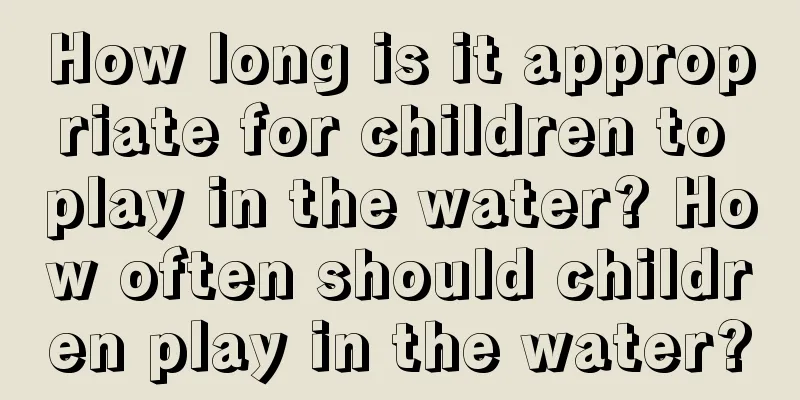How long is it appropriate for children to play in the water? How often should children play in the water?

|
How long is appropriate for children to play in the water? This is a question many people have. Children love playing in the water and often don't want to leave the beach. So parents need to control their baby's entertainment time. How long is reasonable? Today, let's answer this question for you. How long is appropriate for children to play in the water? How long is it appropriate for children to play in the water?The bathing time should generally be controlled within half an hour. If the time is too long, the baby may catch a cold. If the bathroom is relatively closed and the temperature is high, it will also affect normal breathing. Bathing time that is too long will also cause dehydration. Therefore, when bathing a baby, you cannot let the baby play as long as he wants. You must replenish water in time after bathing. Children aged 4 or 5 should not swim for more than half an hour at a time. They should rest for a while before entering the water again. The total time should not exceed one hour. Playing in water is good for your baby's health1. Playing in water can make babies feel a natural happiness, which helps to cultivate their optimistic character. 2. Let your baby have more contact with water from an early age. By playing with water, you can let your baby feel the characteristics of water, stimulate your baby's imagination, develop your baby's intelligence, and make your baby smarter. 3. Playing in water can exercise the body, develop hands-on ability, and promote the baby's physical development. Maybe because babies first spend their lives in amniotic fluid, babies like water very much, and water can make them feel comfortable and happy. Water looks simple, but it has touch and sound. By playing with water, babies can promote the development of touch and hearing. However, children playing with water brings a lot of new troubles to their mothers. Not only do they have to wash a lot of clothes, but the room is also full of water. In addition, children are more likely to catch a cold or have abdominal pain after playing with water, and sometimes playing with water is even dangerous. But we can't just look at these disadvantages. Some people will shout "Do you want to die?" when they see their children walking by the river or the sea. This will only make children afraid of water. You can let your children play on the shore where the water is not too deep and the waves are not too big. By contacting water, you can also promote the development of children's senses. FAQs about baby playing with water.Don't panic if water gets into your child's ears When children are playing or swimming in the water, they will inevitably get soaked and it is common for water to get into their ears. At this time, the child will feel uncomfortable, and parents often use cotton swabs to help the child drain the water from the ear canal, but there are some issues that need to be paid attention to: (1) The cotton swab should not be inserted deep into the ear canal, as this may cause water to enter the ear deeper and damage the eardrum. (2) When a child is crying, you should not use a cotton swab to force the child to drain the water, as this may cause accidental injury to the child. A better approach would be: (1) Use cotton balls instead of cotton swabs. Cotton balls are more absorbent and parents can place them on their children’s auricles and leave them there for a few minutes to absorb most of the water. (2) If you don’t have a cotton ball, you can use a soft cotton handkerchief instead. Roll one corner of the handkerchief around your finger and wipe the moisture off the outer ear. Then roll the other corner of the handkerchief into a long, thin string, gently insert it into the ear, and slowly rotate it to absorb moisture. 2. What to do if your child chokes on water When taking children to play in the water or swim, parents should not be careless just because there are staff to watch over them. They must keep an eye on their children at all times. However, choking on water is a common accident for children, and parents still need to learn the necessary first aid measures: (1) The child’s choking on water was not serious In this case, parents should gently pat their children's backs from bottom to top to help them cough out the water in their trachea. At the same time, parents still need to observe their children's complexion and physical reactions. If they find any abnormal phenomenon, they need to send them to the doctor for treatment in time. (2) The child is at risk of suffocation Once parents find that their children are in such danger, they should call the emergency number immediately and give the child first aid measures: first, stand the child upside down on their legs, then pat their back until water flows out of their mouth and nose, then lay the child flat, and finally start pressing the chest to perform cardiopulmonary resuscitation and wait for the ambulance to arrive. It is not scary for babies to play with water. Parents need to correctly guide their babies on how to play with water. Have you learned the tips for playing with water that I will introduce to you today? It is natural for children to love playing with water. Playing with water will not affect the baby's development but can stimulate the baby's senses. Therefore, learning to properly guide babies to play with water is the most correct approach. For more information, please visit http://www.8bb.com/ |
Recommend
What should I do if my baby is allergic to eggs? What are the symptoms?
Eggs contain a variety of nutrients and are very ...
Which vaginal tightening product is the best? Top 10 vaginal tightening product brands
Vaginal relaxation not only makes women feel infe...
Do I need to open the window to ventilate the scented candles? Why is there a pit in the middle of the scented candles?
Many of us like to light scented candles in our d...
Can pregnant women eat green dates? Taboos on eating green dates
Green dates are a very common fruit. They contain...
Will the baby choke on water during a water birth? What conditions need to be met for a water birth?
I think everyone has heard of water birth. Water ...
Can I wean my baby in winter? Is it good to wean my baby in winter?
Weaning is something that every mother must do. N...
Can children's rhinitis be cured? Can children's rhinitis be treated with nebulization?
Rhinitis is a respiratory disease that is quite c...
What are the symptoms of rare forms of arthritis in children? How is arthritis in children diagnosed?
Arthritis usually occurs in middle-aged and elder...
At what age should children start reading? What kind of books are good for children?
My friend's child is over three years old, bu...
How to teach children to ride a bicycle safely
Exercise can help children stay healthy and impro...
What kind of shoes should I wear during confinement in winter? What kind of shoes should I wear during confinement in winter?
Mothers who are in confinement in winter must pay...
What should I do if my child doesn't like to play with other children? How can parents guide isolated children?
People have different personalities, and their pe...
What is the matter with the black hair on the newborn's ears? Pay attention to two situations
The ears are important organs and need our good p...
Can I rock my baby to sleep? Is it harmful to rock my baby to sleep?
The problem of baby sleeping has always been a di...
Parents can easily build parent-child relationships by playing games with their babies
Parents always want to support their families whi...









